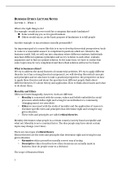College aantekeningen
Aantekeningen Business Ethics
- Instelling
- Rijksuniversiteit Groningen (RuG)
Uitgebreide aantekeningen van alle colleges van het vak Business Ethics. Wordt o.a. gegeven in IB&M, Finance, BA Health, BA Change Management & BA SIM
[Meer zien]




